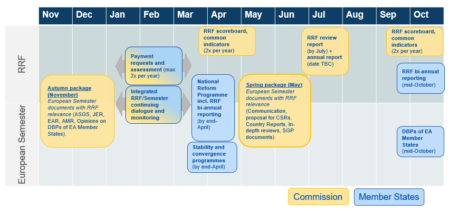European Semester
What is the European Semester?
The European Semester is the main tool at European level to monitor national progress on economic and fiscal policies. Born as a macroeconomic tool within the Europe 2020 strategy, it has become also the tool through which the Commission also makes recommendations for social policy reforms at national level. It is part of the European Union’s economic governance framework which aims to detect, prevent and correct problematic economic trends such as excessive government deficits or public debt levels. Its focus is on the 6-month period from the beginning of each year, hence its named the ‘semester’.

Source: European Commission
During the European Semester Member States are supposed to align their budgetary and economic policies with the objectives and rules agreed at the EU level. The European Semester starts with the publication of the Annual Growth Survey (AGS). The AGS sets out the broader EU objectives for the year to come, with a focus on the economy. Members States produce National Reform Programmes (NRPs) addressing how they implement reform, that are then analysed by the European Commission and the European Council. The European Council replies to the Member States with Country Specific Recommendations (CSRs) as an assessment of their efforts to achieve the EU objectives addressed to their countries.
Following the Covid-19 pandemic and the introduction of the Recovery and Resilience Facility (RRF) to support the economic recovery of Member States, the European Semester has adapted its policy coordination to the RRF’s implementation requirements, thus integrating the National Recovery and Resilience Plans and keeping track of their progress as well.
The European Semester is also linked to the European Pillar of Social Rights (EPSR) and its Action Plan. In the 2022 European Semester, for instance, the country reports include an assessment of the progress made by each Member State on the implementation of the EPSR.
